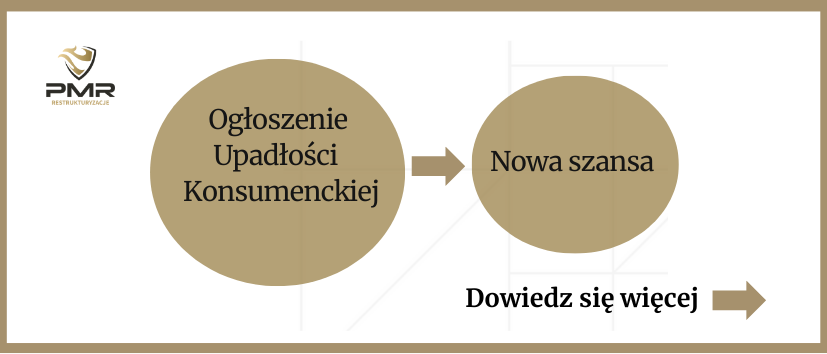Contents:
- A few words about the article - Listen
- 1. What is consumer bankruptcy?
- 2. What documents should be prepared to file an application for consumer bankruptcy?
- 3. What does the court proceeding look like in a case of declaring consumer bankruptcy?
- 4. What does the procedure before the Trustee look like after the declaration of consumer bankruptcy?
- 5. What receivables are subject to write-off in the event of consumer bankruptcy?
- 6. What are the advantages and disadvantages of consumer bankruptcy?
A few words about the article - Listen
1. What is consumer bankruptcy?
Consumer bankruptcy is a legal solution intended for individuals who do not run a business and are unable to repay their financial obligations. Usually, such debt is associated with reasons that arise independently of the debtor's actions, including job loss, a serious health condition that prevents repayment of financial obligations, as well as bad financial decisions. Declaring consumer bankruptcy allows individuals who do not run a business, i.e., any person who is not an entrepreneur, to write off all or part of the debts that they are unable to repay. The purpose of consumer bankruptcy is to enable people in a difficult financial situation to have a fresh start, but for this to happen, you need to prepare appropriately.
2. What documents should be prepared to file a petition for consumer bankruptcy?
The first and most important step to take in order to declare consumer bankruptcy is to prepare the appropriate documents presenting the debtor's financial situation. These documents should confirm:

- Income: income certificates, employment contracts or bank statements;
- Debt: credit agreements, invoices, letters from creditors, letters from bailiffs, court judgments;
- Fortune: notarial deeds, extracts from land and mortgage registers, sale and purchase agreements.
After collecting all the necessary documents, the next step is to file an application for consumer bankruptcy.
3. What does the court proceeding look like in a case of declaring consumer bankruptcy?
The consumer bankruptcy procedure is initiated by the debtor (the person who wants to declare bankruptcy) by filing an appropriate application with the court. The consumer bankruptcy application is filed with the district court with jurisdiction over the debtor's place of residence. The application must include, among other things:
- personal data of the applicant;
- a description of his financial situation;
- a list of the assets and financial liabilities of the debtor.
Bankruptcy application consumer bankruptcy is filed on the appropriate form via the Internet portal: Krajowy Rejestr Zadłużonych (KRZ). To file an application for consumer bankruptcy, the debtor should have an account in the KRZ system. People who are digitally excluded, who are usually the elderly or do not have access to the Internet, have the option of filing an application for consumer bankruptcy on a paper form. The application form can be found on the websites of the courts or collected from the court's registry office.
As part of the proceedings, the competent court assesses the evidence collected and determines whether the debtor is actually in a state of insolvency. It should be remembered that the documents collected may prove insufficient, and the court may call on the debtor to supplement them or provide additional information. If the court finds that the submitted application is justified, it issues a decision to declare consumer bankruptcy. After the declaration of consumer bankruptcy, all financial obligations of the debtor are covered by bankruptcy proceedings.
4. What does the procedure before the Trustee look like after the declaration of consumer bankruptcy?

The declaration of personal bankruptcy is equivalent to the appointment of a bankruptcy trustee, who will be responsible for managing the debtor's assets, repaying the liabilities incurred by him, as well as selling the debtor's assets subject to liquidation and satisfying the creditors from the funds obtained from the sale in accordance with the agreed repayment plan according to the draft prepared by the trustee or in accordance with the application submitted by the debtor regarding the establishment of a repayment plan or an application for the cancellation of liabilities.
After the bankruptcy proceedings are concluded before the bankruptcy trustee, the court issues a decision to terminate the proceedings without establishing a repayment plan or a decision to establish a creditor repayment plan and determines to what extent and within what period the bankrupt will be obliged to repay their liabilities to the creditors. In the event of termination of the proceedings without establishing a repayment plan, the debtor's debt is discharged on the day the decision becomes final. In the event of termination of the proceedings by issuing a decision to establish a repayment plan, in the absence of extraordinary circumstances, the debt is discharged after the repayment plan is completed. In such situations, the repayment plan is established for a period not longer than 3 years and the amount of repayments is adjusted to the debtor's financial capabilities. In the event of extraordinary events, i.e. when the evidence collected indicates that the debtor caused their insolvency or significantly increased its degree intentionally or as a result of gross negligence, this period may be extended to up to 7 years.
The court also determines what part of the bankrupt's liabilities incurred before the date of bankruptcy will be written off after the creditor repayment plan is completed. In the event that the proceedings are terminated without establishing a repayment plan, this is all receivables that may be written off; in other cases, a part of the receivables is written off, reduced by the amounts indicated in the repayment plan.
5. What receivables are subject to write-off in the event of personal bankruptcy?

Within the framework of consumer bankruptcy the debtor can get cancellation of part or all of your liabilities, which were incurred before the declaration of bankruptcy. However, not all receivables are subject to write-off. These liabilities are divided into those that are subject to cancellation and such, which are not subject to write-off.
The receivables that may be written off are:
- Credits and loans – both banking and other financial institutions;
- Liabilities under civil law contracts – e.g. overdue payments for apartment rental, unpaid invoices;
- Overdue bills – e.g. for utilities, telephone, Internet;
- Lease or rental obligations;
- Obligations arising from guarantees;
- Tax arrears (with few exceptions).
Receivables that are not subject to write-off are::
- Maintenance obligations – debts due to unpaid alimony;
- Fines and liabilities resulting from crimes;
- Liabilities for compensation for damage caused intentionally – e.g. liabilities arising from personal injury;
- Liabilities arising from recoverable court fines;
The debt write-off process depends on the court's decision in the bankruptcy proceedings. The debtor must cooperate diligently with both the trustee and the court to achieve the maximum benefits from the proceedings.
6. What are the advantages and disadvantages of personal bankruptcy?
Declaring personal bankruptcy has far-reaching consequences that must not be forgotten and must be considered when submitting an application that provides this special opportunity for debt relief.
It should be remembered that the debtor's assets become the bankruptcy estate on the day of the declaration of bankruptcy. This therefore results in the debtor losing the ability to manage their assets and the possibility of seizing part of the debtor's income for the bankruptcy estate. The trustee appointed in the proceedings after the declaration of bankruptcy manages the debtor's assets, and their goal is to satisfy creditors. As part of consumer bankruptcy, the debtor's assets are liquidated, and the funds obtained from the sale of the assets will be used to cover the costs of the proceedings, as well as to settle the debtor's obligations to creditors.
Another consequence is the limitation of the possibility of concluding new agreements that exceed the scope of ordinary management of the debtor's assets. This means that the debtor, during the bankruptcy proceedings, can only perform everyday activities related to current functioning, such as purchasing food, clothing, cleaning products, but cannot enter into agreements that would increase the state of his debt.
At this point it is worth mentioning that legal acts performed by the bankrupt within a year prior to the date of filing a bankruptcy petition, which he disposed of his assets, are ineffective in relation to the bankruptcy estate if they were performed free of charge or for a fee, but the value of the bankrupt's benefit significantly exceeds the value of the benefit received by the bankrupt. In practice, this means that the trustee will analyze all legal acts performed by the bankrupt within a year of filing a bankruptcy petition and in certain situations may consider them ineffective in relation to the bankruptcy estate, which means that they will be included in the bankruptcy estate. An example of such acts may be a donation of a flat made by the debtor to a family member (son, daughter or spouse).

It is also worth emphasizing that one of the consequences of declaring consumer bankruptcy is also separation of property between spouses. This means that on the day of the declaration of bankruptcy of one of the spouses, the separation of property between the spouses occurs. If the spouses remained in a regime of community of property, the joint property of the spouses is included in the bankruptcy estate, and its division is inadmissible. In practice, this means that only property acquired jointly by the spouses is included in the bankruptcy estate, while property acquired after the separation of property is not covered by the proceedings. Such property is therefore not part of the bankruptcy estate and is not covered by the actions of the trustee. It therefore remains outside the scope of bankruptcy proceedings. However, the question should be asked whether the spouse is, and if so, to what extent, jointly liable for the debts of the other spouse. It must be remembered that the joint property of the spouses is included in its entirety in the bankruptcy estate, so it will also be of great importance whether the separation of property between the spouses was established only at the time of the declaration of bankruptcy or earlier. If the spouses have established the separation of property on a date prior to the declaration of bankruptcy, the date of its establishment is crucial, because the establishment of the separation of property by a property agreement is effective in relation to the bankruptcy estate only if the agreement was concluded at least two years before the filing of the application for consumer bankruptcy. For example, if the spouses went to a notary and established a contractual separation of marital property on 25/05/2022, and then one of the spouses purchased a car on 25/05/2023, and the other spouse filed a petition for consumer bankruptcy on 15/05/2024, the car purchased by the spouse who did not declare consumer bankruptcy will be included in the bankruptcy estate, because the period of two years from the establishment of the separation of marital property to the date of filing the application for consumer bankruptcy has not yet elapsed and the separation of property agreement is ineffective in relation to the bankruptcy estate.
Consumer bankruptcy also brings many benefits to people who are in a difficult financial situation and are unable to repay their debts.
The main ones the advantages of consumer bankruptcy are:
- Debt write-off – in consumer bankruptcy there is a possibility full or partial debt cancellationOnce the proceedings are completed, the debtor may be released from the obligation to repay most of their debts, allowing them to start a new life without debt.
- Protection from creditors – Declaring bankruptcy causes suspension of enforcement proceedings conducted by bailiffs, which means that the debtor is protected from further debt collection activities, e.g. seizure of wages or bank accounts. Suspended enforcement proceedings are discontinued on the date the decision to declare bankruptcy becomes final.
- Regulating the legal situation – consumer bankruptcy allows for sorting out the financial situation and legal status of the debtor.
- A repayment plan adapted to the debtor's capabilities – if the court does not decide to completely write off the debts, it establishes a repayment plan adjusted to the debtor's actual financial capabilitiesThis plan can last from several months to several years, depending on the debtor's situation.
- Regaining mental peace – People declaring personal bankruptcy often feel relief related to ending the pressure from creditors and regaining control over your finances.
- No negative impact on employment – declaration of consumer bankruptcy does not negatively affect employment nor does it mean dismissal from work. Bankruptcy affects the debtor's assets, but not his or her ability to work or earn money.
- Get out of debt faster – for people who are unable to cope with their obligations, consumer bankruptcy may be the most effective way to get out of debt compared to other solutions, such as negotiations with creditors or debt consolidation.
- Cost reduction – although the bankruptcy process may involve certain costs (e.g. court fees, costs of appointing a representative), in comparison to the long-term costs of debt (e.g. interest) it may be more beneficial financially.
- Possibility of obtaining new loans in the future – after the consumer bankruptcy process is completed and the liabilities are written off, the debtor may, over time, regain creditworthiness. Banks and financial institutions will have access to information about past bankruptcy, but it will be possible to gradually rebuild your financial credibility.

Consumer bankruptcy therefore offers new financial start, which is a key advantage for people in debt. However, consumer bankruptcy is a process that helps to get out of a difficult financial situation, but it is associated with many consequences. The decision to declare bankruptcy should be carefully considered, and the debtor must be aware of their obligations and limitations resulting from bankruptcy proceedings. Therefore, when deciding to declare consumer bankruptcy, it is recommended to contact a professional attorney or restructuring advisor who has extensive knowledge in the field of bankruptcy law. Such assistance is offered by, among others, PMR Restrukturyzacje SA or Restructuring Advisor Karolina Kamińska.

























